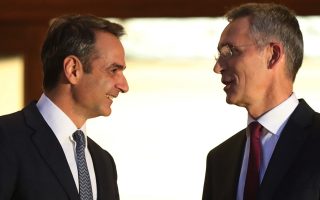PM outlines challenges, achievements at Athens Democracy Forum

Prime Minister Kyriakos Mitsotakis is confident that Greece will be able to deal with Turkey’s increasingly aggressive behavior in the Aegean and off the coast of Cyprus thanks to its “strong” alliances and foreign policy, while he also feels that the Turkish operation in Syria risks “adding another source of instability in an already unstable part of the world.”
“I’ve tried and I’ll always try to engage with President [Recep Tayyip] Erdogan and I’ve told him that it would be in the interest of both our countries if we try to make a restart in Greek-Turkish relations,” Mitsotakis said in a discussion with New York Times columnist Roger Cohen at the Athens Democracy Forum in the Greek capital earlier on Thursday.
“Turkey is a difficult customer that doesn’t play by the rules,” he said, accusing Ankara of flouting international laws and encroaching on Cyprus’ sovereign rights by moving drillships into its exclusive economic zone for hydrocarbon exploration.
“You can’t just show up with a drillship and say ‘This is mine’ simply because you don’t recognize international law,” Mitsotakis said, adding that the European Union should take a “very clear” stance against such violations.
On Turkey’s military advance against Kurdish forces in northeast Syria, the Greek prime minister warned that “any unilateral intervention in an unstable country without the support of the United Nations that will at the same time give rise to extreme terrorism is clearly the wrong strategy.”
Nevertheless, he said when asked whether Ankara’s behavior may be seen as a sign of Turkey drifting into Russian President Vladimir Putin’s camp, “there’s an interest in keeping Turkey anchored to Europe.”
Brussels should also “continue to support Turkey financially to deal with the refugee crisis,” Mitsotakis said, adding that, during a recent private meeting, he had warned Erdogan against using migration as a “lever to put pressure on Europe.”
On the subject of the refugee crisis, Cohen referred to what he called “the resilience of Greek humanity through such hardship,” citing his experience on the eastern Aegean island of Lesvos at the peak of the migration crisis in September 2015.
“What is it about Greece that even in the midst of deep crisis it resists the transactional nature of modern society and retains the ability to look a human being in the eye, realize that human being has certain basic rights, including the right to human dignity?” he asked.
“Maybe because that’s who we are and I’m proud of that,” Mitsotakis responded, adding, however, that “this should not be perceived as weakness of the Greek state to protect its own territory.”
His recently elected center-right government, he added, is introducing a “rigid migration policy” that will speed up the process of granting asylum to refugees entitled to protection and deporting those who are not.
“We have basically sent the signal in the past years that the easiest way into Europe is through Greece. Of course we will take care of a shipwreck in the middle of the Aegean but that does not mean we don’t have an obligation to our citizens to manage what is no longer a refugee problem but primarily an economic migration problem in a much more effective manner,” Mitsotakis said.
The Greek prime minister also responded to a question concerning the evacuation of squats in central Athens that were being used as accommodation for refugees and migrants from a young Afghan woman who was evicted from one such facility. “Me and my family were in the streets,” said the woman, who identified herself as Ariane.
“We are providing as humane conditions as possible for everyone who’s seeking asylum in this country,” Mitsotakis responded. “What I will not accept as prime minister is for refugees to be taken advantage of by networks of illegal activities and to be placed in buildings under occupation.”
Cohen also commented on what he described as an “air of new optimism here in Athens,” asking how Greek democracy survived the biggest recession outside wartime, soaring unemployment, the rise for a while of the far-rightist group Golden Dawn and a feeling of collapse.
“Why did Greece just not fall off the cliff?” he asked.
“Obviously because we demonstrated collective intelligence at the ballot box,” Mitsotakis quipped.
“I think what happened in this process was an exercise by which Greek society matured significantly and realized that populists, when they come to power, don’t offer any real solutions to real problems,” he said.
“What I find interesting was that this was not a top-down exercise. It was very much an exercise where our political narrative found common ground with society, which matured from the bottom up,” he added.
Agreeing with Cohen that the failure of Western democracies and the reason behind the rise of populist movements has been the “failure of the privileged to understand the have-nots,” Mitsotakis conceded that as the scion of a political dynasty with a private American education he could be seen as the “poster-boy of the elite.”
Asked whether he could make the “imaginative leap” to put himself in the shoes of the have-nots, he said: “You have to. You have to do the best that you can to put yourself – as much as you can intellectually – in that position.”
“Elites failed to understand that the grievances on which the populist backlash was based were absolutely real. We have to take a lesson from the failures that resulted in this,” the prime minister said.
Listing his government’s priorities and achievements so far, including an across-the-board reduction in property tax rates and initiatives to speed up the development at the former Athens airport in Elliniko, Mitsotakis described the recent sale of treasury bills at a negative yield – something that would have been “inconceivable even a year ago” – as being a “vote of confidence in the Greek government.”
He also appeared confident that the upbeat mood will be maintained domestically as well, saying that the so-called honeymoon period will last longer because “it’s a rational honeymoon rather than an emotional one… because it’s based on the belief that something might actually change.”
“People are feeling good because we’ve exceeded expectations,” Mitsotakis said. “May I remind you that when Mr [Alexis] Tsipras was elected in 2015 he had much higher approval ratings than I have now – and then it all crashed,” he added.





